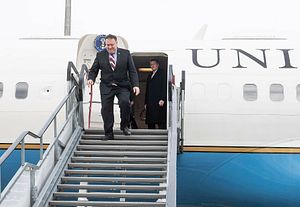U.S. Secretary of State Mike Pompeo said on Monday that America might be forced to scale back certain operations in Europe and elsewhere if countries continue to do business with the Chinese telecommunications company Huawei.
Pompeo made the comments in Budapest on the first leg of a five-nation European tour during which he said he would raise American concerns about China and Russia’s growing influence in Central Europe. He said he also would discuss concerns about the rule of law, democracy and human rights in the region, particularly in Hungary, where nationalist Prime Minister Viktor Orban has been criticized for increasingly authoritarian rule.
On Huawei, which is a major player in Hungary, Pompeo said he would make the case to Orban and other officials that doing business with the company comes with significant risks for information security and privacy that could imperil cooperation with the United States. U.S. officials are deeply troubled by Huawei’s expansion in Europe, especially in NATO members including Hungary, where they believe it poses significant threats.
“They are a sovereign nation. They get to make their own decisions with respect to these things,” Pompeo told reporters at an impromptu news conference at the U.S. Embassy in Budapest. “What is imperative is that we share with them the things we know about the risks that Huawei’s presence in their networks present — actual risks to their people, to the loss of privacy protections for their own people, to the risk that China will use this in a way that is not in the best interest of Hungary.”
“We have an obligation to share this with them, and we will do so,” Pompeo said. “But second, we have seen this all around the world. It also makes it more difficult for America to be present. That is, if that equipment is co-located where we have important American systems, it makes it more difficult for us to partner alongside them. We want to make sure we identify (to) them the opportunities and the risks with using that equipment. And then they will get to make their decisions.”
Pompeo will take the same message to his next stop, Slovakia, on Tuesday, before heading to Poland, where he will participate in a conference on the future of the Middle East expected to focus on Iran. He will wrap up the tour with brief stops in Belgium and Iceland.
Ahead of his visits to Budapest and Bratislava, U.S. officials said Pompeo hoped to reverse what they called a decade of U.S. disengagement in Central Europe that created a vacuum that Russia and China have exploited. Over the course of the past 10 years, the officials said, Russian President Vladimir Putin and Chinese leaders have become much more aggressive in the region and made inroads.
President Donald Trump’s administration has made a point of reaching out to Orban, who shares Trump’s strong stance on limiting migration and has adopted increasingly authoritarian measures, including cracking down on the opposition, labor unions, independent media and academia.
President Barack Obama’s administration had largely steered clear of Orban, who won a third consecutive term last year in a campaign based on anti-immigration policies and whose policies have been met with street protests and deepening concern within the EU.
Pompeo put the blame for much of the backsliding on the lack of U.S. engagement.
“So many of the concerns that are voiced are things that have happened in the absence of America being engaged, so I think it’s centrally important that we’re here,” he said. “We’ll certainly make the case about the things that we see that we wish were different here.”
Pompeo said the United States “is never shy of promoting its value set, our concerns about the humanitarian situation, civil liberty, rule of law.” He said the U.S. “will certainly talk about those things, and I’m confident we’ll find common ground to work forward on lots of things that are important.”
Last month, Orban said he wanted “anti-immigration forces” to become a majority in all European Union institutions, including its Parliament and the EU’s executive Commission, and predicted that there would soon be two civilizations in Europe — one “that builds its future on a mixed Islamic and Christian coexistence” and another in Central Europe that would be only Christian.
Orban’s government has been targeted for criticism, including from the U.S., for forcing a Budapest-based university founded by billionaire philanthropist George Soros to move most of its programs to Vienna. His fiery rhetoric against migrants and refusal to join a new European Union public prosecutor’s office focusing on fraud and corruption also have raised concerns.
The U.S. has repeatedly accused China of using technology to pilfer trade secrets. China recently has said that it’s “totally unreasonable” to make some of these accusations and that the U.S. is just trying to suppress a rising competitor.
By Matthew Lee for Associated Press.

































